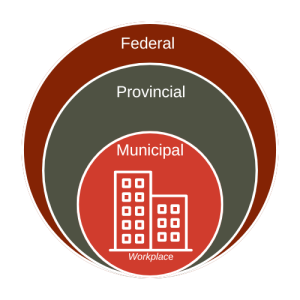7.1 Workplace Legislation
Legislation refers to laws passed by a government body that professionals in any industry are required to comply with while performing their work. In Canada, there are three layers of legislative law: Federal, Provincial, and Municipal.

Municipal legislation uses bylaws enforced by the city or township in which the business operates. Municipalities do not have independent legislative authority to create new legislation but are empowered by provincial legislation to uphold legislation using bylaws. Municipalities are largely responsible for rules regarding water and sewage systems use, public services such as fire departments and police, property use, fencing, waste collection, composting, and recycling programs. These laws are meant to reflect the opinions and needs of citizens residing in the local community.
Provincial legislation addresses the needs of people living in the province. Provinces are responsible for legislation regarding education, environment, agriculture, transportation infrastructure, civil rights, prisons, consumer protection, emergency preparedness, privacy, public health and safety, workplace safety, and healthcare.
Federal legislation governs all the people in the country. Federal legislation focuses on the Constitution, national interests, international relations, immigration, criminal law, national defence, and the postal service.”

